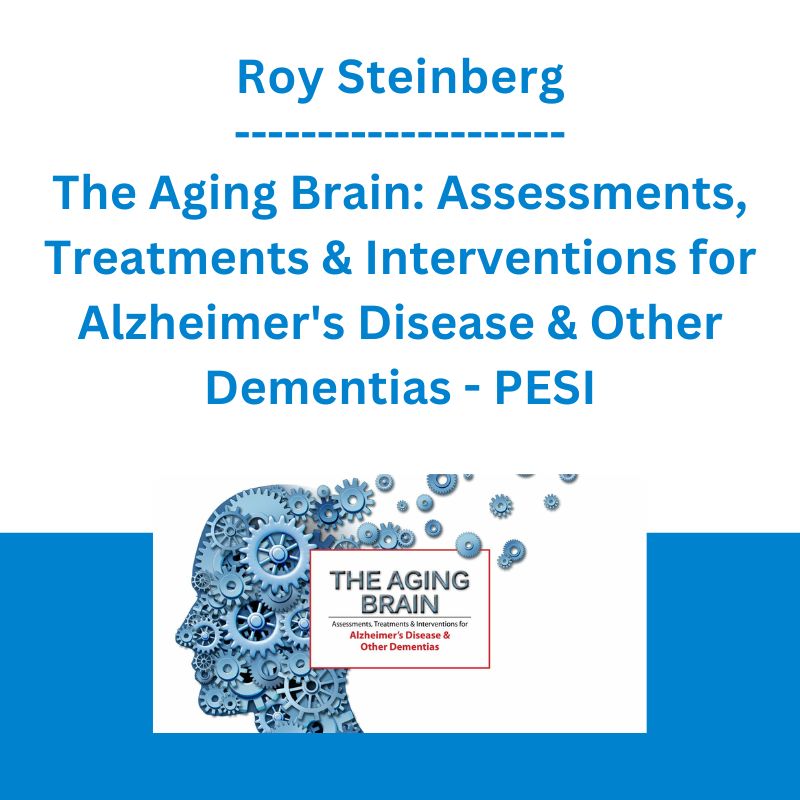*** Proof of Product ***
Exploring the Essential Features of “Roy Steinberg – The Aging Brain: Assessments, Treatments & Interventions for Alzheimer’s Disease & Other Dementias – PESI”
The Aging Brain: Assessments, Treatments & Interventions for Alzheimer’s Disease & Other Dementias
Speaker: Roy D. Steinberg, Ph.D.
Duration: 6 Hours 08 Minutes
Format: Audio and Video
Description
Individuals with dementia interact with a variety of professionals including nursing staff, psychologists, counselors, social workers, OTs, PTs, SLPs, home health aides, adult day center staff, and first responders.
But whatever your profession, proper skills and understanding of the disease is needed to work with this population. Without the appropriate training, safety risks grow and opportunities to improve care and quality of life are missed.
This essential training program will provide you with the tools, strategies, and practices you need to best serve patients facing Alzheimer’s disease and other dementias.
In just one day you’ll learn how you can better assess for and differentiate between different types of dementias, overcome the communication issues that can obstruct quality care, work more collaboratively with family and caregivers, maximize daily functioning, and safely and effectively intervene when difficult behaviors arise.
Objectives
- Analyze the impact of dementia on brain structure and function, and determine the difference between “normal forgetfulness” and cognitive impairment.
- Differentiate dementias from one another by identifying manifestations of each type.
- Articulate differences between the Folstein Mini-Mental Status examination and SLUMS and effectively utilize them as screening measure tools for cognitive impairment and dementia.
- Employ adaptable behavioral interventions that can provide patients with individualized care and promote more effective participation in therapy.
- Investigate the concept of caregiver guilt and its implications for the client, clinicians, and those caring for older adults with dementia.
- Correlate patients’ strengths and limitations to potential therapeutic approaches when developing treatment plans for older adults with dementia.
Outline
Mental Health Evaluation
- Depression
- Anxiety
- Alcohol Abuse
Cognitive Disorder and “Forgetfulness”
- Transient Cognitive Decline
- Pre-cursor to dementia
- Mild Neuro-Cognitive Disorder
Diagnostics of Dementing Conditions
- Alzheimer’s
- Vascular
- Parkinson’s
- Lewy Body
- Frontotemporal
- Reversible Conditions
Cognitive Assessment Tools
- Mini-Mental State Examination
- SLUMS
- Clinical applications
- Administration and scoring
- Objective and subjective interpretation
- Therapy modalities
Differentiate Dementia and Depression
- Clinical indicators of depression and anxiety
- Practical application
Psychopharmacology
- Early and Mid-stage Alzheimer’s – Acetylcholinesterase Inhibitors
- Mid and Late-stage Alzheimer’s – Neurotransmitter Glutamate
- Alternate interventions
Behavioral Interventions
- Intervention strategies for depression, poor appetite, verbal and physical combativeness, refusing ADL care
- Strategies for coping mechanisms for the caregiver and clinician
Working with Caregivers at Home
- Caregiver guilt
- Depression
Ethics
- Responsibility to patient
- Reporting abuse
- Power of Attorney
- Documentation
Target Audience
- Social Workers
- Psychologists
- Occupational Therapists
- Physical Therapists
- Nurses
- Speech-Language Pathologists
- Counselors
- Nursing Home Administrators
- Assisted Living Facility Administrators
- Long Term/Acute Care Professionals
- Case Managers
- Marriage & Family Therapists
Reviews
Jill T
“Excellent presentation and information. I especially appreciated the presenter’s actual examples given to clarify and reinforce the information that he was presenting. There were so many additional notes that I made on the handouts that it took longer than the 6.25 hours to complete this course. This information will be useful to me, family members and friends as we travel through our later years. Thank you for having these quality programs for us.”
Thomas C
“Excellent innovative use of split screens =presenter/slides. The virtual participants have 100% access to that of the actual audience. PLEASE PLEASE place all future live webinars/recorded/DVDs in this format!!!!!”
Tasleem V
“Excellent course, presenter was very knowledgeable and engaging! Appreciated research studies and client examples! Will take what I learned today to clinical practice tomorrow! Thank you!”
Please see the full list of alternative group-buy courses available here: https://lunacourse.com/shop/









